新目标八年级下册英语Unit4 He said I was hard知识点
山东省肥城市湖屯镇初级中学八年级英语下册 Unit 4 He said I was hard-wording 句型总结 人教新目标版

Unit41.他说我很努力。
2.她说周五晚上她要为拉那举行一个令人惊喜的聚会。
3.他说他将带一些饮料和小吃来玛西亚的家。
4.你能把一些音乐CD带到晚会上来吗?5.他说他不在对我生气了。
6.每周六我去沙滩。
7.他说每周六他去沙滩。
8.明天我将给你打电话。
9.他告诉我明天他会个我打电话。
10.我能说三种语言。
11.她说她能说三种语言。
12.我想让汤姆把这个信息传给你。
13.他借了我的夹克并且没有归还我。
14.今天早上,你被要求在车站见面来把夹克归还给杰克。
15.今天下午,我要见苏,你想让我传递一些信息。
16.我擅长讲法语。
(两种表达)17.在英语中,比起听力来我更擅长读。
18.在数学方面我能做的更好。
(两种表达)19.我的朋友擅长英语所以他经常帮助我的功课。
20.你的成绩怎样?你的物理老师说什么?他说我很懒,我应该仔细一些。
21.一切可好?我希望爷爷现在好起来。
听到他上周感冒我很难过,我希望你身体健康。
22.上周我完成了期末考试并且今天我得到了我的成绩单。
23.当我看到来自学校邮箱的信封时我总是紧张。
但是我做的还可以。
24.在开始的时候我感觉紧张,幸运的是我做的可以。
25.这个学期,我在学习科学方面有困难。
26.我不惊奇的发现我最坏的成绩来自于我的科学老师。
她说我很懒,那不是真的,那只是我发现科学确实困难。
27.另一个令人失望的结果是在历史方面。
我的历史老师说我能做的更好。
28.好消息是我的数学老师说我努力,我的西班牙老师我的听力很好。
29.那就是现在我所有的新闻。
30.他不知道外面正发生什么。
31.上周我和我最好的朋友大大吵了一架并且他不和我说话。
32.事情完全开始与当他问我是否他能抄我的作业。
33.我问她为什么她想那样做。
34.我认为对他来说抄袭我的作业并不是一个好主意。
35.他说他不再想做我最好的朋友了。
36.我确信他能克服它。
37.他说如果自己做功课会好得多。
38.他说帮助别人改变了他的生活。
英语人教版新目标八年级下册知识整理Unit4

【英语】八年级||下册教材全梳理(Unit4 He said I was hard -working )知识·巧学生词巧解【词析】音析:元音字母a读[].形析:形近词sad(忧愁的;悲哀的)义析:angry and crazy【典句】He was mad with joy.他欣喜假设狂.【拓展】固定搭配:be mad at/with =be angry with/at 生……的气【词析】音析:元音字母a发[e],ore在词尾读作[].形析:any(任何) +more(更多)义析:any longer,from now on【典句】He doesn ,t come here anymore.他再也不到这儿来了.【拓展】可构成not...anymore词组,也可写成no more .表达"不再〞的词组还有not...any longer/no longer,no more 和no longer用于句末.【辨析】not...anymore/no more与not...any longer/no longernot...anymore/no more指做某事次数不再增加,多与瞬间动词连用;not...any longer/no longer指时间上不再延续,多与持续性动词连用.first of all 首||先【词析】形析:first(第|一) +of +all(所有)义析:at first,the beginning【典句】First of all,you should think,and then speak.你应该先考虑,后开口.【拓展】first of all的同义词为at first,反义词为at last,in the end,finally等.【词析】音析:元音字母e发[e],a发[I].形析:mess(混乱) +age(年龄)义析:information,news sent to sb.in writing or speech【典句】Will you take this message to your brother?把这个便条捎给你哥哥好吗?【拓展】与message有关的词组有:give sb. a message 给……传个口信take a message for sb. 为……捎个口信leave a message 留言pass on 传递【词析】义析:take sth.to different places【典句】Let us now pass on to the next subject.现在让我们看看下一个题目.【拓展】后接宾语时可以构成pass on sth. to sb./pass on sb. sth.,当宾语为代词时只能用前一种.【词析】音析:重读开音节词,u读作[],元音字母o发本音[].形析:sup(超) +pose(姿态)义析:think about sth.that is not real now【典句】Let ,s suppose (that) the news is true.让我们假定这消息是真的 .【拓展】固定搭配:be supposed to被期望或被要求do well in 在……方面做得好【典句】I do well in drawing.我擅长画画.【拓展】be good at 相当于do well in,意思为"擅长……〞.be good at 的比较级||为be better at,do well in 的比较级||为do better in .be in good health 身体健康【词析】形析:be +in(在……状态下) +good(好的) +health(健康)义析:keep healthy,keep fit【典句】I hope you are in good health.我希望你身体健康.【拓展】表示身体健康的其他短语有:be healthy 健康的stay/keep healthy 保持健康【词析】形析:er读作[],ou读作[].形析:nerv(e)(神经的) + -ous(形容词后缀)义析:not relaxed,not comfortable【典句】I felt very nervous when I went into his office.当我走进他的办公室时,我感到很紧张.【拓展】固定搭配:be nervous about对……感到紧张【词析】音析:重读闭音节词,字母u读作[],i和y读作[I].形析:lucky(幸运的)变y为i + -ly(副词后缀)义析:fortunately【典句】Luckily,the police came right away.很幸运,警察马上就来了.【拓展】1)同根词:luck n.运气;lucky adj.幸运的2)反义词:unluckily【词析】音析:元音字母u读作[],词尾的e不发音.形析:形近词blue(蓝色)义析:right,not against【典句】Is it true that you are rich?你很富有是真的吗?【拓展】同根词:truth n.真理;truly adv.真实地【词析】音析:ow读作[].形析:形近词town(城镇)义析:belong to oneself【典句】She makes her own clothes.她自己做衣服.【拓展】own作为形容词意为"自己的〞,常用在表示所有格的词后起强调作用.作为动词意为"拥有〞,名词为owner(主人) .轻轻告诉你Every heart has its own sorrow.各人有各人的苦恼.get over 克服;恢复;原谅【词析】形析:get(得到) +over(在上面)义析:recover,forgive sb.【典句】Can we get over this difficulty?我们能克服这个困难吗?【拓展】与get有关的词组有:get to 到达get on 上车get off 下车get ready for 为……作准备get up 起床【词析】音析:第|一个a读作[],第二个a读作[I] .义析:person who finish the study in a college【典句】Two thirds of the graduates find jobs.三分之二的毕业生找到了工作.【拓展】作为动词意为"毕业〞可构成graduate from "毕业于……〞.【词析】音析:闭音节词,字母i读作\I\] .形析:形近词than(比)义析:not dense or concentrated【典句】The air there is very thin.那里的空气很稀薄.【拓展】作"稀薄的〞讲时反义词为thick,作"瘦的〞讲时反义词为fat .【词析】音析:字母e和i均读作[I],sion读作[].形析:deci(de)(决定) +sion(名词后缀)义析:something you must make a choice at one time【典句】She could not make a decision about the dresses.她对(买不买)这衣服下不了决心.【拓展】make a decision to do sth. =decide to do sth.(决定做某事)【词析】音析:ar读作[].形析:star(星星) +t义析:begin【典句】If you are ready,you may start your work.如果你准备好了,你可以开始工作了.【拓展】start作为动词"开始〞时与begin同义,其后可接动名词或动词不定式.【辨析】begin与start一般情况下,这两个词都可接动名词或动词不定式,二者用法相同.以下两种情况下只能用start,而不用begin .1)当机器"开动、发动〞时.2)作为"旅途〞开始时.care for 照顾,照料【词析】形析:care(关心) +for(为了……)义析:take care of,look after【典句】The boy is too young to care for himself.这个男孩太小,不能照顾自己.【词析】音析:元音字母a发本音[eI],字母组合er发[].形析:d +anger (愤怒)义析:risk;a source or an instance of risk or peril【典句】In war,life is full of danger for everyone.在战争中,每个人的生活都充满了危险.【拓展】1)与danger有关的词组有:in danger 在危险中out of danger 出险;脱险2)danger的形容词形式:dangerous例句精讲Section ALana thinks she ,s coming to my house to study.拉娜以为她要到我家来学习.【巧解句构】这是一个含有宾语从句的主从复合句,主句为一般现在时态,从句是用趋向性动词come的现在分词表将来.【拓展延伸】宾语从句的时态必须与主句照应:当主句中谓语是现在或将来时态,从句谓语不受主句谓语时态的影响,可以按需要使用任何时态,例如:She says that she has never been to Mount Tai.1)当主句谓语为过去时态,从句中的时态一般为过去的某种时态.例如:He said he had finished his homework.2)当从句表达的是某一客观真理(事实)时,主句无论是何种时态,从句那么用一般现在时.例如:He said that light travels much faster than sound.误区警示假设宾语从句跟在动词think,believe,suppose,expect等表示"要,认为〞等的动词后时,句子的否认表达在主句上,这就是"否认转移〞现象.例如:I don ,t think you are right.我认为你不正确.I don ,t believe he has finished his work.我相信他还没有完成他的工作.Section B 3a1.I was sorry to hear that he had a cold last week.我听说他上周感冒了觉得很难过.【巧解句构】这是一句包含宾语从句的主从复合句.主句是过去时态,从句也用过去时态.本句中that变为了宾语从句he had a cold last week的引导词.【要点剖析】I was sorry to hear that...是表示遗憾的常用语,意为"我听到……很遗憾〞.have a cold意为"患感冒〞还可以写成catch a cold .类似的词组还有:have a cough 咳嗽have a fever 发烧have a headache 头疼2.I had a really hard time with science this semester,and I wasn ,t surprised to find that my worst report was from my science(科学)teacher.这学期我的科学课学得确实很吃力,所以当我看到最||糟糕的评价来自于科学课老师时,我毫不吃惊.【巧解句构】这是一句由and连接的并列句.前一个分句是简单句,后一个分句是包含宾语从句的主从复合句,主句I wasn ,t surprised to find "我毫不吃惊地发现……〞,不定式的动词find后面带一个由that引导的宾语从句.【要点剖析】词组have a hard time with sth.意为"应付某事很费力〞;be surprised to意为"对……感到吃惊〞,不定式后接动词的原形.surprised为形容词,surprise为名词构成to one ,s surprise(使……惊奇的是)词组.【辨析比较】surprised 和surprising1)当人作主语或修饰与人有关的词时用以ed结尾的形容词.2)当物作主语或修饰与物有关的词时用以ing结尾的形容词.例如:We are surprised to hear the surprising news.我们听到那条令人惊讶的新闻感到非常吃惊.3.The good news is that my math teacher said I was hard -working.好消息是数学老师说我很用功 .【巧解句构】这是一句包含表语从句的主从复合句 .主句the good news is使用的是一般现在时,表示目前的情况.由that引导的从句my math teacher said I was hard working在句中充当表语,使用的是一般过去时,陈述过去.其中又包含一个从句I was hard working,作said的宾语.【拓展延伸】表语从句于主句中的系动词之后,主要有四类:1)由连词who,what,which 等引导的表语从句.这些词不但可以起连接作用,还可以在句中作主语、宾语和表语.例如:China is not what she was yesterday.中|国已不再是以前的那个中|国了.2)由不充当任何句子成分的连词that,whether引起的表语从句.例如:What I mean is that we should help each other.我的意思是我们应该互相帮助.The problem is whether we can finish the work on time.问题是我们能不能按时完成工作.3)由连接副词when,where,why,how 引导的表语从句 .例如:This is when I really get to know Americans.我这时才开始认识美|国人.4)由连词as,because,as if,as though 引导的表语从句.例如:It looks as if it is going to rain tonight.看起来好似今晚要下雨.Self Check 2Last week in school we had a big fight,and she didn ,t talk to me.上周在学校我们大吵了一架,她不和我说话了 .【巧解句构】这是一个and连接的前后均是一般过去时态的并列句.【要点剖析】1)短语have a fight意为"吵架〞,后面接宾语时要加上介词with,即have a fight with等同于fight with sb.(此时的fight为动词) .2)短语talk to sb.意为"与……谈话/交谈〞,to也可以被with替换 .如果talk后面接的是"某事〞那么介词用about即talk about sth. .She said helping others changed her life.1.Teaching high school students in a poor mountain village in Gansu Province may not sound like fun to you.在甘肃省一个贫困山村教中学生,在你听来也许并不有趣 .【巧解句构】该句是个简单句.这句话的主语很长,一个动名词短语(teaching high school students "教中学生〞)加上两个地点状语(in a poor mountain village "贫困山村〞和in Gansu Province "甘肃省〞)构成了本句的主语.谓语局部那么使用了sound like短语,表示"听来并不有趣〞.【要点剖析】短语sound like 意为"听起来像……〞,sound是一个系动词,类似的词还有:feel,smell,taste,look,get,turn等.2.She said that both she and her husband thought this was a good idea.她和她丈夫都认为这是一件很好的事.【巧解句构】该句是个复合句,said后面的that引导的是宾语从句,是said的内容;句中的thought后面也是一个宾语从句,但省略了引导词that .通常宾语从句由that引导时,常可省去that,但said后的that常保存.【要点剖析】词组both...and...意为"(两者)都〞是并列连词可以连接两个人或物一起作主语.反义词为neither...nor...,它们的用法不同:neither...nor...引导的词作主语时谓语动词与nor 后的词保持一致即就近原那么;both...and...无此用法 .3.There is no difference between you and them.你和他们之间没有不同.【巧解句构】该句是一个there be句型,名词difference作句子的真正主语,no相当于not any .There is no difference between...and...意为"在……和……之间没有区别〞 .如果表示"有区别〞,那么使用There is a difference between...and...或者There are differencesbetween...and... .【要点剖析】词组between...and...表示"在……之间〞,between只用于二者之间.【拓展延伸】there be句型的一些用法:1)主谓一致谓语动词要采取就近一致原那么,和靠近be的主语一致.例如:There is a pen,two rulers in the box.盒子里有一只钢笔,两把尺子.There are two boys and a teacher at the school gate.门口有两个男孩,一个老师.2)主语后的动词形式在there be 句型中,主语与动词是主动关系时用现在分词;是被动关系时用过去分词.例如: There is a purse lying on the ground.地上有一个钱包.There are five minutes left now.现在还有5分钟.3)反意疑问句反意疑问句应与there be对应,而不是依据主语.例如:There is a radio on the table,isn ,t there?桌子上有一台收音机,是吧?There are more than fifty classes in your school,aren ,t there?你们学校有50个班,是吧?4)there be 与have的替换there be表示所属时可与have替换.There is nothing but a book in my bag. =I have nothing but a book in my bag.在我包里只有一本书.记忆要诀there be 句型的谓语歌诀there be句型可译"有〞,be 动词跟着名词走.名词单数不可数,当用is记清楚.如果名词是复数,用are一定要记住.出现并列主语特殊记, "就近原那么〞用仔细.4.I can open up my students , eyes to the outside world and give them a good start in life.我能为我的学生翻开眼界看外面的世|界,并且给他们的生活一个好的开始 .【巧解句构】该句是一个含有情态动词的一般现在时态的简单句,and连接前后两个并列谓语.【要点剖析】1)短语open up one ,s eyes 意为"使……开眼界〞.2)动词give有两种用法:give sb. sth.和give sth. to sb. .5.When her year was over,she said that she would return to the area after finishing her studies.一年期满时她说:毕业后她会回到这个地方.【巧解句构】该句是个包含时间状语从句和宾语从句的主从复合句.时间状语从句when her year was over意为"当她的一年(支教)期结束时……〞.主句是一个间接引语,that...studies作said的宾语从句,时态为过去将来时,说明是在"当时〞要离开的时候,杨蕾承诺"将来〞要回到这个地方;在这个宾语从句中after finishing her studies作为一个时间状语,点明了她将要回来的时间为"完成学业后〞.【要点剖析】1)短语be over意为"结束〞.2)return to...意为"返回……〞.语法解读直接引语和间接引语引述或转述别人的话称为"引语〞.直接引用别人的原话,两边用引号"〞标出,叫做直接引语;用自己的语言转述别人的话,不需要引号,叫做间接引语,实际上间接引语大都是宾语从句,其中由祈使句转换的间接引语除外,其转换后是不定式.那么直接引语为陈述句、一般疑问句、特殊疑问句和祈使句,转换为间接引语时,句子的结构,人称、时态、时间状语和地点状语等都要有变化,如何变化呢?一、人称的转变下面有一句顺口溜"一随主,二随宾,第三人称不更新〞可以帮助我们记忆."一随主〞是指在直接引语变间接引语时,如果从句中的主语是第|一人称或被第|一人称所修饰,从句中的人称要按照主句中主语的人称变化.例如:He said, "I am very happy.〞He said that he was very happy."二随宾〞是指直接引语变间接引语时,假设从句中的主语及宾语是第二人称或被第二人称所修饰,从句中的人称要跟引号外的主句的宾语一致.如果引号外的主句没有宾语,也可以用第|一人称,例如:She said to her son, "I ,ll check your homework tonight.〞She said to her son that she would check his homework that night."You should be more careful next time,〞my grandfather said.My grandfather said that I should be more careful the next time."第三人称不更新〞是指直接引语变间接引语时,如果从句中的主语及宾语是第三人称或被第三人称所修饰,从句中的人称一般不需要变化.例如:Mr.Smith said, "Jack is a good student.〞→ Mr.Smith said Jack was a good student.总之,人称的转换不是固定的,具体情况、具体对待,要符合逻辑.二、时态的转换直接引语改为间接引语时,主句中的谓语动词如果是过去时,从句(即间接引语局部)的谓语动词在时态方面要作相应的变化,变成过去时范畴的各种时态(实际也是宾语从句的时态要求),变化如下:一般现在时→一般过去时现在进行时→过去进行时现在完成时→过去完成时一般将来时→过去将来时一般过去时→过去完成时过去完成时→不变过去进行时→不变例如:1. "I am very glad to visit the Great Wall ,〞she said.→She said she was very glad to visit the Great Wall.2.Jim said, "We are listening to the music.〞→Jim said that they were listening to the music.3.Mother asked, "Have you finished your homework before nine o ,clock?〞→Mother asked me whether I had finished my homework before nine o ,clock.4.He asked the policeman, "Where shall I find the nearest bookshop?〞→He asked the policeman where he would find the nearest bookshop.5. "Why did she go there?〞the teacher asked.→The teacher asked why she had gone there.6.Mother asked me, "Had you finished your homework before supper?〞→Mother asked me whether I had finished my homework before supper.7.Tom said, "We were having a football match this time yesterday.〞→Tom said that they were having a football match that time the day before.三、结构的转换1.陈述句.用连词that引导,that在口语中常省略.主句的谓语动词可用直接引语中的said,也可用told来代替,注意,可以说said that,said to sb. that,told sb. that,不可直接说told that .例如:He said, "I have been to the West Lake.〞He said to us that he had been to the West Lake.He said, "I ,ll give you an exam next week.〞He told us that he would give us an exam the next week.(不可说told that)此外主句中的谓语还常用repeat,answer,reply,explain,think等.例如:He said, "I ,m late because of the heavy snow.〞He explained to us that he was late because of the heavy snow.2.直接引语为一般疑问句,也称是否疑问句,间接引语用连词whether或if引导,原主句中谓语动词said要改为asked(me/him/us等),语序是陈述句的语序,这一点非常重要.例如:He said, "Do you have any difficulty with this work?〞He asked (me) whether/if I had any difficulty with this work.3.直接引语为特殊疑问句,改成间接引语时,原来的疑问词作为间接引语的连词,主句的谓语动词用ask(sb.)来表达,语序改为陈述句语序.例如:He asked me, "How many classrooms have been built in your school?〞He asked me how many classrooms had been built in our school.4.直接引语为祈使句时,改为间接引语,用带to的不定式表达,谓语动词常是ask,advise,tell,warn,order,request等.如ask sb.to do,(由肯定祈使句变成)ask sb.not to do(由否认祈使句转变),并且在不定式短语中的时间状语、地点状语、人称及时态都作相应的变化.例如:He said, "Be quiet,please.〞He asked us to be quiet."Don ,t touch anything in the lab,〞the teacher said.The teacher warned the students not to touch anything in the lab.四、时间状语和地点状语的转换在直接引语中在间接引语中指示代词this thatthose表示时间的词now thenthat daythat week(month,etc.)the day beforethe week(month,etc.)beforethree days (a year ,etc.)beforethe next (following) daythe next (following)week (month,etc.)表地点的词动词there take go但要注意在以下几种情况,直接引语变为间接引语时,时态一般不变化:1.直接引语是客观真理."The earth moves around the sun ,〞the teacher told me.→The teacher told me the earth moves around the sun.2.直接引语如果是一般现在时,表示一种反复出现或习惯性的动作.例如:He said, "I get up at seven every morning.〞→He said he gets up at seven every morning.3.如果直接引语中的情态动词没有过去时的形式(例如:had better,used to)和已经是过去时的形式时,(例如:could,should,would,might)不再变.例如:Peter said, "You had better come have today.〞→Peter said I had better go there that day.听说速递1.表达观点I think you are...我想你是……I think you are right.Thank you.I think you are good at English.I think you are lazy.I think you are hard working.2.表达问候How ,s it going?一切都顺利吗?Does everything go well?Is everything going well?How are you?Fine,thanks.Best wishes to you.3.表达遗憾I ,m sorry to hear that...我听到……很遗憾.What a pity!I ,m sorry.It ,s unfair for you.4.表达希望I hope that...我希望……I hope that you are better now.I hope you are happy.Have a good time!Have a good trip.读写指导如何写好限制性作文【点石成金】1.仔细审题,明确要求.对题目所提供的信息要认真分析,明确要求,做到心中有数.要对所提供的信息加以分析、整理,使之更加具体化、条理化,为开始动笔作好前期准备工作.还要搞清这那么题目的要求是写短文、日记、信件还是便条等,以便根据不同的题材、体裁,写出不同格式、风格各异的文章.此外,也应注意所要求的人称、时间、地点、人物等信息,防止用错.2.抓住重点,寻求思路.根据题目所提供的信息,草拟一个提纲,寻求逻辑次序,确定从何下手,再围绕这一次序,周密选词、选句,以便更加贴近主题;否那么,语无伦次的文章将不会被人接受.3.用词恰当,表达流畅.在写作过程中,万一哪个词想不起来了,千万不能空着或不写,最||好找一个同义词或用其同义句、同义词组(短语)代替.表达中不写没有把握的句子,尽可能用自己熟悉的词和句子来表达意思.表达中,尽可能采用一些简单句,并使前后句、上下文过渡自然.正确使用and,or,but,because,so等词以便使行文自然流畅,使人读后不至||于有"死水一潭〞之感觉.还应注意各种时态、语态和各种句式的交替使用,使文章显得得体、大方、错落有致.4.成文之后全面检查全文.着重看是否存在以下问题:格式、拼写、标点、扣题、不标准英文、时态、语态、主谓一致、冠词、介词、单复数、比较级||别、顺序、大小写、代词等用法错误或使用不当.【常用词汇】ever,mad,anymore,pass on,suppose,do well in,in good health,nervous,worst,lucky,hers,own,get over,meter,ate,decision,open up,start,care for,danger 【常用句型】1)What did...say?……说什么了?2)He said I could...他说我能……3)He told me he would...他告诉我他将……4)Mary said she would...玛丽说她将……5)I think you are... 我想你是……6)How ,s it going?一切都顺利吗?7)I ,m sorry to hear that... 我听到……很遗憾.8)I hope that... 我希望……9)Really?You ,re lucky.真的?你真幸运 .典题·热题例1 (2021福建福州模拟) -Do you know _________?-She came by bus.A.when she got to schoolB.why she was late for classC.how she came to school this morningD.how many times she was late for class思路解析:此题考查宾语从句的用法.主句为一般现在时态,从句可以根据表达的需要选择任何时态.根据答语可知,从句应用一般过去时态.由"by bus〞可知,对于交通工具提问只能用"how〞.答案:C误区警示此题有两处误区:一是时态,主句为一般现在时态,从句往往会误用一般现在时态;二是语序,忽略宾语从句需用陈述句语序.例2 (2021浙江杭州模拟) -Why didn ,t Alice come to the party last night?-I don ,t know _________.A.why didn ,t sheB.why she didn ,tC.why did sheD.why she did思路解析:宾语从句应用陈述句语序,故A、C项错,由题意可知,是"我不知道她为什么不来〞应用否认句,故D项错.答案:B例3 (2021湖北黄冈模拟) -Can you see ___________?-No,let ,s go and have a look.Maybe we can help them.A.what was happening thereB.what are they doing thereC.what are they talking aboutD.what is happening there思路解析:此题考查的是宾语从句的用法.当问及"你能看见……〞时,可知事情正在进行,因此应该用现在进行时态,故A不对.宾语从句应按陈述句语序排列,故B、C两项不对.D项中的what作主语,故D项是正确的.答案:D例4 (2021南通模拟) When you are sleeping,you had better _______ all your windows closed.,t keep B.not keepC.not to keepD.not keeping思路解析:此题考查had better的用法 .had better无论是用在肯定句还是在否认句中,后面都只能接动词原形.因此,C、D项均错.而had better的否认形式为had better not,故A错.答案:B误区警示better为形容词good和副词well的比较级||,这使人常常会想起"be +adj. +to do〞这种结构,会误以为had better to do sth.是正确搭配,从而错选C项 .深化升华记牢"had better(not) +动词原形〞这种结构.例5 (2021南京模拟)Susan is always the best in different exams in our class because she is a ___________ girl.-working思路解析:此题考查词的用法.此句意为"苏珊在我们班的不同的考试中总是最||好的〞,而helpful意为"有帮助的〞,polite意为"有礼貌的〞proud意为"自豪的〞,hard -working意为"努力的〞,只有hard -working与题意相符.答案:D误区警示多数形容词都可作定语修饰名词,如果不能理解词义,很容易出现误选.深化升华多动口,多动手,勤读读,多练练,掌握词的音、形、义就一路畅通了.例6 完形填空(2021河北模拟)Big schoolbags have been a serious problem for students for a long time.Maybe your schoolbags is too 1 to carry,and it troubles you a lot 2 you want to find a book out to read.Now an e -textbook will 3 you.It is said that e -textbooks are going to be 4in Chinese middle schools.An e -textbook,in fact,is a small 5 for students.It is much 6 than a usual schoolbag and easy to carry.Though it is as small as a book,it can 7all the materials(材料) for study.The students can read the text page by page on the 8,take notes with the pointer(屏写笔),or even "9〞their homework to their teachers by sending e mails.All they have to do is to press a button.Some people say e -textbooks are good,but some say they may be 10for thestudents , eyes.What do you think of it?D.understandD.practice9.A.find out B.hand inC.get backD.give back思路分析:此题为完形填空题,是模拟必考题之一也是一道综合题.应从四方面入手:1.认真阅读短文,从句意词义入手,选择适当的词填空.2.从词的用法入手,看考查的是哪个词,它有什么用法.3.从固定搭配入手,包括介词的用法.4.从时态入手,根据时态的不同选用不同的动词形式 .在正确理解句意的前提下,抓住关键句,找到突破口.运用学过的词,词组或语法对空下"药〞.希望能在不断的练习中提高自己的综合语言运用能力,提高自身的素质.答案:1~5 BDCAD6~10 BACBD深化升华1.由"Big schoolbags have been a serious problem for students for a long time.〞可以判断出.2.由句意可知此句为"当你想找出一本书来读时,他会麻烦很多〞因此只能由when来引导时间状语从句.3.由句意可知"现在一本e -textbook将帮助你〞.4.比照各选项的词义可判断出,这里指"被使用〞.5.通读全文我们可以知道既可以用屏写笔在上写也可以读,可以判断出只能是台电脑.6.因为本文是对学生们的书包越来越重深表担忧,因此e textbook肯定更轻,因此lighter 符合题意.意为"保持,保存〞,build意为"建筑,建造〞,discover意为"发现〞,practice意为"练习,实践〞.根据词义只有hold符合题意.8.这是一种电子书因此只能有screen(荧屏) .9.根据选项的词义以及句意只有hand in(上交)与作业有关.表转折,因此前面说好(good)后面一定与此相反(bad) .例7任务型阅读(2021福建福州模拟)。
八年级英语下册《Unit4HesaidIwashard-working》课件3人教新目标版
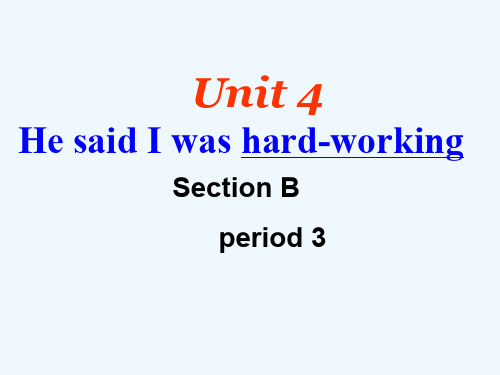
Name ____
Class ____
Math– hard-working
Spanish—good at speaking
History—should do better
Science—lazy student
4
Write your own report card. (Have fun. You don’t have to tell the truth!)
with other students. My Englfioshr tmeaychmeor nsathideIxwaamss.
good at speaking and listenin_g._I_s_h_o_u_l_d_m__or_e_p_r_a_c_t_ic_e
writing and reading. My Chin_e_s_e_t_ea_c_h_e_r_s_a_id__I_w_a_s__
• ____ I’m hard-working. • ____ I’m good at speaking. • ____ I’m lazy. • ____ In English, I’m better at
reading than listening. • ____ I can do better in math. • ____ I’m careless. • ____ I should work harder at
ห้องสมุดไป่ตู้
see the envelope from school in the mall, but luckily I did OK this
• ____ I’m hard-working.
• ____ I’m good at speaking.
八年级英语unit 4 he said i was hard-working. 人教新目标版知识精讲
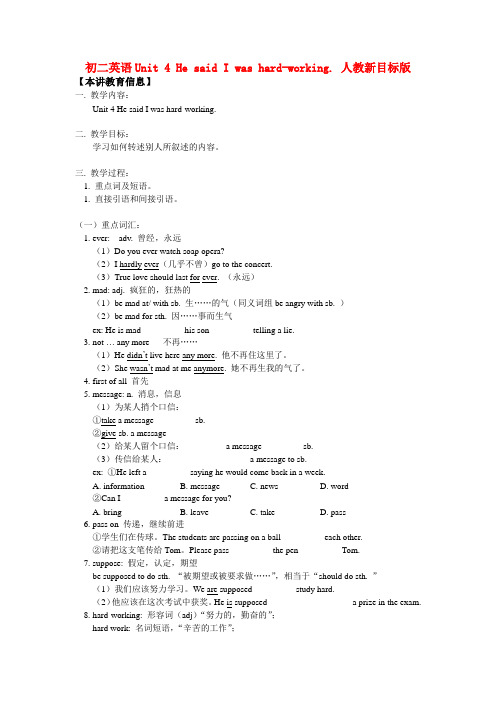
初二英语Unit 4 He said I was hard-working. 人教新目标版【本讲教育信息】一. 教学内容:Unit 4 He said I was hard-working.二. 教学目标:学习如何转述别人所叙述的内容。
三. 教学过程:1. 重点词及短语。
1. 直接引语和间接引语。
(一)重点词汇:1. ever: adv. 曾经,永远(1)Do you ever watch soap opera?(2)I hardly ever(几乎不曾)go to the concert.(3)True love should last for ever. (永远)2. mad: adj. 疯狂的,狂热的(1)be mad at/ with sb. 生……的气(同义词组be angry with sb. )(2)be mad for sth. 因……事而生气ex: He is mad _________ his son _________ telling a lie.3. not … any more 不再……(1)He didn’t live here any more. 他不再住这里了。
(2)She wasn’t mad at me anymore. 她不再生我的气了。
4. first of all 首先5. message: n. 消息,信息(1)为某人捎个口信:①take a message _________sb.②give sb. a message(2)给某人留个口信:_________ a message _________sb.(3)传信给某人:_________ _________ a message to sb.ex: ①He left a _________ saying he would come back in a week.A. informationB. messageC. newsD. word②Can I _________ a message for you?A. bringB. leaveC. takeD. pass6. pass on 传递,继续前进①学生们在传球。
听目标八年级下Unit 4 He said I was hard-working.难点聚焦

她说 她非 常喜欢 英语 , 一点也 不 喜欢数 学 。 她
1 .直 接 引 与 间 接 引 语 , 语 . 。 。. , 一
当引用 别人 的话 时 , 我们 可以用 别人 的原 话 , 也可 以用 自己的话把 意思 转述 出来 。 如果 是 引用原 话 , 弓 用 的部分 称 为直接 引语 。如 果转 述别 人 的话 , 称 为间接 引语 。例 如 : 被 1 就 L n ad Im n tgig t h rh ue o r a ih.( 接 引语 ) a asi,“ ’ o on o e o s n Fi y ng t 直 d ”
讯 e 孥 引
如
h s i s w as .avi d he a i r hd ty ng a b t ay par
主 母
是一
.
过 去
她 现 她 赞 一 , 土 r,源自= 粲 云 0 I , 1
攀
S e si h ts ew ud n tg oJm’ p r . h a ta h o l o o t i s at d y
舔
…
嚣
… 一 一 —
~
堕 坠
攀
新目标八年级下 U i 4 H ad 辫 nt e s i 1 s h r- r ig难点聚焦 wa a dwo kn 一
单 词 翥[
m d很 生气 的 ;a y oe再 也 ( ) a nm r 不 ;mesg sa e消息 ;sp oe 定 , 为 ;hr— okn u ps 假 认 adw rig勤 劳 的 ,
她说 她不 会去 吉姆 的 聚会 。
2Ln sd h ws’md t aiayo・ 娜 ,不 对 西 感 恼 。 辫 .a is a t a aMr mr 拉 说她 再 玛 娅 到 火了 a a e n c n e a
八年级英语下册: Unit4《He said I was hard-working Reading》课件 人教新目标版

画面里是一个苏丹女童挣扎在去救济站路上,即将饿毙跪倒在地,而兀鹰正在女孩后方 不远处,虎视眈眈,等候猎食女孩的画面。
Children are unable to go to school
We need help … old people
We need help …
disabled people
Thank you for listening!
Yang Lei said she enjoyed her time as a volunteer very much.
3b Ask and answer these questions.
Discussion
What do you think of Yang Lei? Do you agree with it?
poor mountain village.
C. Yang Lei’s students liked her very much.
Put these words into the correct space as you read.
world brothers changed agreed
mountains different
send volunteers to teach in China’s rural areas.
a Peking University graduate
Yang Lei
Reading strategy:
First read for meaning, not for details. You can understand the meaning of a word you don’t know from the context.
2013新版新目标英语八年级(下) Unit 4 He said I was hard-working.

Unit 4 He said I was hard-working.主备:李云彩(黄鱼圈中学)校对:一、教材分析本单元通过转述别人的话学习直接引语和间接引语,并通过―看肥皂剧转述剧中人的话和向家长转述老师对自己的评价‖这些练习活动,来理解和掌握直接引语和间接引语之间的转换规律。
培养学生学会利用精读和泛读,并能根据上下文推测生词的阅读策略。
提高学生灵活理解和运用词汇的能力,激发和培养学生热爱学习和乐于助人的品质。
二、目标引导(一)重点词汇message, village, area, meter, decision, husband, start, influence, hometown, danger, suppose, copy, ate, return, nervous, true, lucky, own, poor, thin.(二)重点短语1.have a surprise party 举办一个惊喜的聚2.be/get mad at/with sb. 生某人的气3.not…any more 不再4.bring sth. to sw. / sb. 把某物带到某地/某人5.direct speech 直接引语6.reported speech 间接引语7.first of all 首先8.call sb. 给某人打电话9.do a homework projectwork on a homework project 做家庭作业10.at one’s house doing a homework project在……家做作业11.pass sth. to sb.pass sb. sth. 把……传递给……12.pass on… 传递pass sth. on to sb. 把……传递给……13.be supposed to do sth. 被期望或被要求…14.do better in…在……方面做得更好15.be in good health 身体健康16.finish my end – of – year exams 结束年终考试17.report card 成绩单18.get nervous 变得紧张19.in the mail 在邮件中20.have a really hard time with science 自然课学得很吃力21.be surprised to do sth. 做……感到很吃惊22.help sb. do / with sth. 帮助某人做某事23.have a big fight 打了一大架24.talk to sb. 跟某人说话25.have a fight 打架26.start a bad habit 养成/开始坏习惯27.I’m sure that… 我确信……28.get over 克服29.in a poor mountain village 在一个贫穷的山村30.sound like fun to sb. 对你来说听起来是件趣事may not sound like fun to sb. 或许不是你的兴趣所在31.on a one – year program 在为期一年的援助计划中32.the Ministry Education 教育部33.Chinese Y oung Pioneers 中国少年先锋队34.sea level 海平面35.agree with sb. 同意……的观点36.open up one’s eyes 打开……的眼界/ 拓展学生的视野37.make sb. do sth. 使得某人做某事38.care for 照料、照顾39.doctors without borders 没有国界的医生40.wild animals in danger 处于危险中的野生动物(三)重点句型1.She said she was mad at Marcia.2.She said she was having a surprise party for Lana on Friday night.3.He told me he would call me tomorrow.4.She said she could speak three languages.5.It all started when she asked me if she could copy my homework.6.I asked her why she wanted to do that.(四)语法:现在完成进行时直接引语和间接引语(Direct speech and reported speech)(五)话题学会转述别人的话三、重难点解读1.She said she was having a surprise party for Lana on Friday night.她说她准备在周五的晚上为拉娜举办一个惊喜聚会。
教学设计:Unit 4 He said I was hard-working(人教新目标八年级下)

Unit 4 He said I was hard-working.Period 1Teaching aims:1. Knowledge aims:Key vocabularies: mad, anymore, direct speech, reported speechSentence patterns: What did she say?She said she was having a party for Lana.What did your teacher say?She said she could speak three languages.2. Ability aims: To train Ss’ listening and speaking skills.To train communicative abilities of students3. Moral aims: Try best to make students be interested in communicating inEnglish. And always be ready to help others in their life.Teaching important and difficult points:1. Master the new words, the direct speech and the reported speech and thekey sentences in Grammar Focus2. Report what others say correctly.Teaching methods:1.Situation teaching method2.Task-based teaching methodmunicative teaching methodTeaching tools: A recorder, a tape and some picturesTeaching procedures:Step1 Leading in: Duty report about weather or other daily thingsEnjoy a beautiful music.Step2 Warming up: Greetings and review the words:1 再也不,不再------2 首先-------3 消息--------4传递-------------- 5假定----- 6被期望-----7生某人的气----- 8举行惊喜晚会-----(题目形式复习单词和词汇,进入上课的学习环境)Step 3 PresentationAsk several students what they are going to do after school. And write their sentences on the BbEg: T: What are you going to do after school?S1:I’m going to play soccer after school..S2: I’m going to help my motherS3: I will have a party for my sister..Then teacher says: These Ss talk about what they are going to do after school ,if you want to tell a friend what they said ,how would you tell him ? Who can tell me what they three said just now?S3: He said he was going to play soccer after school .Then write the sentence on the Bb.T: What did S2 say?S4: She said she was going to help his mother . (Also write it on the Bb.)T: In this unit we’re going to learn to use words like this to report what others said.Then underline the words ―He said‖ and ―She said‖ in the sentencesStep 4 1a Group work1.Point out the TV screens in the picture .Ask one student to read what the personsays in the first picture .Then ask another student :What did she/he say ? Help to answer :She/He said she/he was having a surprise party for Lana on Friday night .2.Then group work to deal with other pictures like this. (任务型教学和小组学习的方式,体现了学生主体,老师为主导的教学思想,培养英语综合运用能力。
八年级英语下册 Unit4 He said I was hard-working section A 2a-2c课件
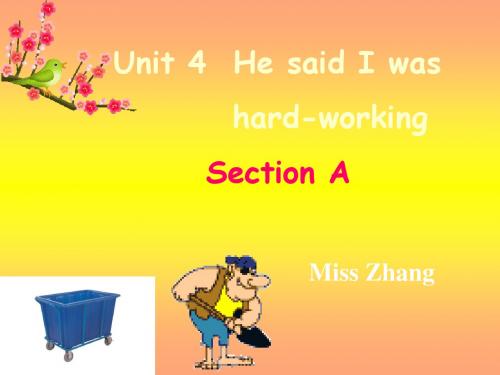
男孩女孩 看看谁的眼力尖, 看看谁的眼力尖,脑力快
间接引语 直接引语变间接引语
7She said "This is my computer".
7.She said this was her computer.
8.They said "We are having a surprise party.
Marci a
Marcia said she was having a surprise party for Lana on Friday night. 意外的
Lana
Lana said she was mad(生气 at Marcia. 生气) 生气 be mad at sb. =be angry with sb. 生某人的气
直接引语: 直接引语:He said , “This is my computer.” ” 间接引语: 间接引语:He said that was his computer.
直接引语变为 间接引语注意: 间接引语注意:
人称 时态 所有格
直接引语
am\is are Have\has will can do
3Susan said:"I go shopping every Sunday.
3.Susan said she went shopping every Sunday.
男孩女孩 看看谁的眼力尖, 看看谁的眼力尖,脑力快
间接引语 直接引语变间接引语
4.Tom said:"My favorite sport is football.
男孩女孩 看看谁的眼力尖, 看看谁的眼力尖,脑力快
新课标人教版八年级英语下册Unit 4 He said I was hardworking--SEC

Unit 4 He said I was hardworkingPart 1: Teaching designSECTION AGoals To learn toreportwhat someone saidTo learn such words as: first of all Ever, mad, anymore, message, hardworking,surprise party, report cardProceduresWarming up learning about Direct speech and reported speechIndirect Speech (also referred to as 'reported speech') refers to a sentence reporting what someone has said. It is almost always used in spoken English.If the reporting verb (i.e. said) is in the past,the reported clause will be in a past form. This form is usuallyone step backinto the past from the original. Structures Reported speech; Simple past tense; Can for ability TargetlanguageWhat did your math teacher say? He said I was hard working. I can speak three languages. What did she say? She said she could speak three languages. VocabularyEver, mad, anymore, message, hardworking, surprise party, report card first of all Learningstrategies Listening for key words; Self-evaluatingFor example:He said the test was difficult.She said she watched TV every day.Jack said he came to school every day.If simple present, present perfect or the future is used in the reporting verb (i.e. says) the tense is retained.For example:He says the test is difficult.She has said that she watches TV every day.Jack will say that he es to school every day.If reporting a general truth the present tense will be retained.He said, “I live in Paris.”He said he lived in Paris. He said, “I am cooking dinner.” He said he was cooking dinner.He said, “I have visted London twice.”He said he had visited London twice. He said, “I went to New York last week.”He said he had gone to New York the week before. He said, “I had already eaten.” He said he had already eaten.He said, “I am going to find a newjob.”He said he was going to find a new job.He said, “I will give Jack a call.” He said he would give Jack a call. 1a Doing groupworkHello, class! We shall go to watch a soapopera first of all.But l et’s talk about these questionsfirst.What is a sopa opera?What are some of the soap oeras you know?Do you ever watch soap opera?What are some things that happen onsoap opera?Daytime dramas so named because they were originally sponsored by the makers of laundry detergent in the early days of television.Aserialized program usually dealing with sentimentalized family matters that is broadcast on radio or television (frequently sponsored by a pany advertising soap products)A soap opera is an ongoing, episodic work of fiction, usually broadcast on television or radio and most recently on mobile phones. This genre of TV and radio entertainment has been in existence long enough for audiences to recognize them simply by the term soap. What differentiates a soap from other television drama programs is their open-ended nature. ...1b Listening and numberingListen and number the statements [1-4] on page 26 inthe picture.Now you will read the tapescript for the structure of “reported speech”.1c Asking and answeringIn pairs you are to ask and answer about what the people in the soap opera said.Listen and circle true or false for each statement.the top.Listen again. What did the people on TV say? Circle the correct answers. Answers: 1-is; 2-will; 3-am; 4-am; 5-will2c Doing pairworkNow in pairs you will make a conversation about “Young Lives” that you saw last night.Next you are going to read a newspaper story on page 28 and try to fill in the blanks.Ne xt we are going to do some writing practice. Let’s imagine the next episode of “Young Lives” and try to finish the newspaper story on page 28.In groups of four you are going to role play conversations according to the three role play cards on page 28.Closing down by having a quiz on reported speechMary “I love chocolate.”Jill: “Mary said (that) she ___ chocolate.”a.lovedb. lovesc. loving Answer aMary: “I went skiing.”Jill: “Mary said (that) she ___ skiing.”a. wentb. had gonec. have gone Answer bMary: “I will eat steak for dinner.”Jill: “Mary said (that) she ___ eat steak for dinner.”a. willingb. willc. would Answer cMary: “I have been to Sydney.”Jill: “Mary said (that) she ___ to Sydney.”a. had beenb. has beenc. was being Answer aMary: “I have had three cars.”Jill: “Mary said (that) she ___ three cars.a. hasb. has hadc. had had Answer cMary: “I'm going to go to Long Beach.”Jill: “Mary said (that) she ___ going to go to Long Beach.”a. isb. wasc. went Answer bMary: “I don't like spinach.”Jill: “Mary said (that) she ___ like spinach.”a. doesn'tb. don'tc. didn't Answer cMary: “I have never been to London.”Jill: “Mary said (that) she ___ never been to London.”a. hadb. hasc. have Answer aMary: “I was swimming.”Jill: “Mary said (that) she ___ swimming.a. has beenb. had beenc. have been Answer bMary: “I had a cat.”Jill: Mary said (that) she had ___ a cat.”a. haveb. hasc. had Answer cMary: “I can't swim.”Jill: “Mary said (that) she ___ swim.”a. can'tb. couldn'tc. can not Answer bMary: “I won't buy a new car.”Jill: “Mary said (that) she ___ by a new car.”a. won'tb. willc. wouldn't Answer cMary: “I have to do my laundry.”Jill: “Mary said (that) she ___ to do her laundry.”a. hadb. hasc. have Answer a。
新目标英语八年级下unit_4重点短语句型语法+配套试题(答案)
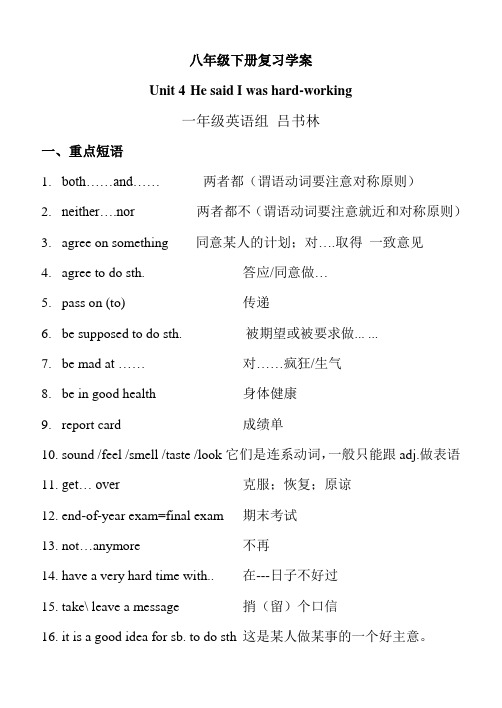
八年级下册复习学案Unit 4 He said I was hard-working一年级英语组吕书林一、重点短语1.both……and……两者都(谓语动词要注意对称原则)2.neither….nor 两者都不(谓语动词要注意就近和对称原则)3.agree on something 同意某人的计划;对….取得一致意见4.agree to do sth. 答应/同意做…5.pass on (to) 传递6.be supposed to do sth. 被期望或被要求做... ...7.be mad a t ……对……疯狂/生气8.be in good health 身体健康9.report card 成绩单10.sound /feel /smell /taste /look它们是连系动词,一般只能跟adj.做表语11.get… over 克服;恢复;原谅12.end-of-year exam=final exam 期末考试13.not…anymore 不再14.have a very hard time with.. 在---日子不好过15.take\ leave a message 捎(留)个口信16.it is a good idea for sb. to do sth 这是某人做某事的一个好主意。
17.there is no difference between…and..在…和…之间没有区别18.the Hope Project 希望工程本单元目标句型:1.转述他人话语:What did sb. say? He said I …She said she…They said…许老师告诉我徐梦蝶会说二种语言。
Mr. Xu told me that XuMengdie could speak three languages.许老师说地球绕着太阳转。
Mr. Xu said (that)the earth turns around the sun. 许老师告诉我他将去北京。
Unit4 He said I was hard-working
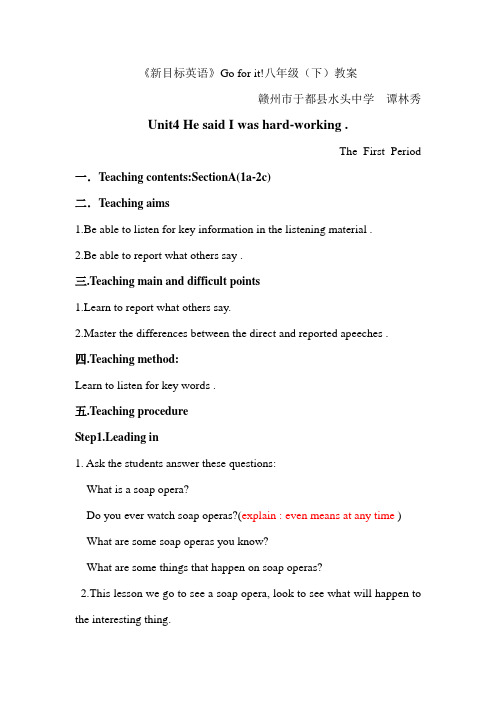
《新目标英语》Go for it!八年级(下)教案赣州市于都县水头中学谭林秀Unit4 He said I was hard-working .The First Period 一.Teaching contents:SectionA(1a-2c)二.Teaching aims1.Be able to listen for key information in the listening material .2.Be able to report what others say .三.Teaching main and difficult points1.Learn to report what others say.2.Master the differences between the direct and reported apeeches .四.Teaching method:Learn to listen for key words .五.Teaching procedureStep1.Leading in1. Ask the students answer these questions:What is a soap opera?Do you ever watch soap operas?(explain : even means at any time ) What are some soap operas you know?What are some things that happen on soap operas?2.This lesson we go to see a soap opera, look to see what will happen to the interesting thing.Step2.Presentation1.Ask the students to open the book and see and face. See pictures of 1, and see what they do.2.Encourage one student to read aloud the dialogues in the big picture to the class and the others study the three dialogues carefully.3.Teach grammar point direct speech and reported speech.Direct speech:说话人直接引用别人的原话。
八年级下unit4说课稿

八下英语Unit4 Unit 4 He said I was hard-working说课稿各位同行,大家好!今天我说课的内容是新目标八年级下Unit 4 He said I was hard-working. 现在我就本单元的内容从以下几个方面进行分析:一.说教材(一)、教材内容分析本单元的中心话题是:Report someone said. 围绕这一话题,主要涉及句型:—What did your math teacher say?—He said I was hard-working.—I can speak three languages.—What did she say?—She said she could speak three languages.本单元的语法项目是宾语从句,直接引语和间接引语,要注意在间接引语中,人称和时态的变化。
(二)、教学重点和难点1、教学重点A、能够正确转述他人话语,会报告自己和他人的成绩单。
B、掌握直接引语和间接引语的意义、功能和用法。
C、进一步熟练一般过去时和过去进行时。
2、教学难点直接引语和间接引语的相互转换。
(三)、教学目标1、语言知识目标立足语言实践活动,在完成任务的过程中掌握动词短语,核心词汇,直接引语和间接引语。
2、文化意识目标通过本单元的学习,让学生知道如何用英语正确转述他人话语。
3、语言技能目标1)能捕捉特定的信息,抓住关键词。
2)具备较熟练的运用英语转述他人话语的能力。
3)增强学生运用英语获取更多语言信息的能力并进行阅读策略的培养。
4、学习策略目标学生能在一定程度上形成自主学习、有效交际、用英语思维和收集信息的能力,使学生在做中学英语。
5、情感态度目标A、客观、合理的评价自己和他人。
B、能主动帮助有困难的人,有助人为乐的高尚情怀。
二. 说教法1.“Teach English in English”: 即新课标倡导的“用英语教英语”,尽量用英语教学,创造英语课堂良好的听的环境,让学生充分感知,积极体验,大胆实践,把握用英语交际的机会,鼓励学生大胆开口说英语。
新目标英语八年级下册Unit 4 He said I was hard-working.讲解与练习

第 1 页 (共4 页) 第 2 页 (共4 页)学校 姓名 班级 考场 考号---------------------------------○密------------------ -------------------○封----------------------------- -- --○线----------------------------※※※※※※※※※※※※※※※答※※※※※※※※※※※※※※※※※※题※※※※※※※※※※※※※※※※线※※※※※※※※※※※※※新目标英语八年级下册Unit 4 He said I was hard-working.讲解与练习班级 姓名重点词组及句型:1. first of all 首先2. pass on 传递3. be supposed to 被期望或被要求,应该…4. do better in 在……方面做得更好5. be in good health 身体健康6. report card 成绩单7. get over 克服;恢复;原谅8. open up 打开9. care for 照料;照顾 10. have a party for sb. 为某人举行一次聚会 11. be mad at sb. 对某人愤怒 12. hear about/of 听说 精讲巧练1. I asked her why she wanted to do that, and she said that she had forgotten to do hers. 我问她为什么要那么做,她说她忘记做作业了。
forget to do sth. 忘记做某事 (还没有做 forget doing sth. 忘记做过某事 (已经做过了)例如:When you leave the classroom, don’t forget to turn off the lights.离开教室时,别忘记关灯。
八下Unit_4_He_said_I_was_hard-working!

This is my computer.
所有格
What did he say?
所有格
直接引语:He said : ―This is my computer.‖ 间接引语:He said this was his computer.
直接引语变为 间接引语注意:
人称 时态 所有格
直接引语
am\is are
I can speak English.
The boy said he could speak English.
The nurse said, “I will take
care of you.”
The nurse said she would take care of me\us.
I can fly in the sky.
间接引语
was were
Have\has
will can do
had
would could did
直接引语 一般现在时 一般将来时 现在进行时
间接引语 一般过去时 过去将来时 过去进行时
过去时态
I am hard-working every day. 我每天都很认真学习。
He said he was hardworking every day. 他说他每天都很 认真学习。
Section A
Period 2
I can play the piano
I can speak three languages
What did she /he say?
She said she could play the piano.
He said he could speak three languages.
八年级英语(下)第4单元Section B知识详解新目标

Unit 4He said I was hard-working.Section B1.I’m good at speaking.我擅长口语。
be good at/ for/ to辨析:(1) be good at表示“在……方面(学得、做得)好,擅长于”。
如:He is good at Maths. 他数学学得好。
She is good at playing basketball.她擅长打篮球。
注:be good at≥do well inShe is good at English.≥She does well in English.be good for 表示“对……有益处(好处),有利于……”。
如:Taking a walk after supper is good for your health.晚饭后散步对你的健康有益。
注:be good for 的反义词组为be bad for。
如:Watching TV much is bad for your eyes.过多看电视对你的眼睛有害。
be good to 表示“对……和善(仁善)”,相当于be kind to 。
如:She is very good to her students. 她对她的学生很好。
注:to 后接动词原形,则表示“适于……”。
如:Is this water good to drink? 这水适于喝吗?(2) be good at 和do well in辨析be good at 擅长,较笼统地指某一方面有特长、很优秀。
do well in在……成绩好,在...做得好,在……表现好,指在具体某一次活动或某一件事情中做得好或做得出色或指学校功课、成绩好。
现以例子来说明它们意思的区别:You are good at English你英语好,你擅长英语。
You do well in English你英语成绩好(英语成绩好,并不表示你的英语就很好了,比如你在学七年级的英语时很刻苦,成绩好,但尽管你的成绩很好,但你不能说你英语就很好了,你不能说你擅长英语,毕竟你学的只是七年级的英语,另外,说不定会半途而废呢,说不定你八年级英语成绩很差呢。
unit 4 he said i was hard4
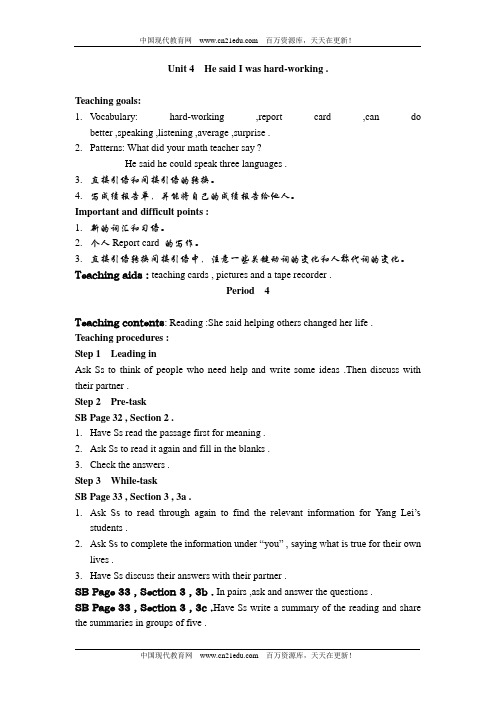
Unit 4 He said I was hard-working .Teaching goals:1.V ocabulary: hard-working ,report card ,can dobetter ,speaking ,listening ,average ,surprise .2.Patterns: What did your math teacher say ?He said he could speak three languages .3.直接引语和间接引语的转换。
4.写成绩报告单,并能将自己的成绩报告给他人。
Important and difficult points :1.新的词汇和习语。
2.个人Report card 的写作。
3.直接引语转换间接引语中,注意一些关键动词的变化和人称代词的变化。
Teaching aids : teaching cards , pictures and a tape recorder .Period 4Teaching contents: Reading :She said helping others changed her life . Teaching procedures :Step 1 Leading inAsk Ss to think of people who need help and write some ideas .Then discuss with their partner .Step 2 Pre-taskSB Page 32 , Section 2 .1.Have Ss read the passage first for meaning .2.Ask Ss to read it again and fill in the blanks .3.Check the answers .Step 3 While-taskSB Page 33 , Section 3 , 3a .1.Ask Ss to read through again to find the relevant information for Yang Lei’sstudents .2.Ask Ss to complete the information under “you” , saying what is true for th eir ownlives .3.Have Ss discuss their answers with their partner .SB Page 33 , Section 3 , 3b . In pairs ,ask and answer the questions .SB Page 33 , Section 3 , 3c .Have Ss write a summary of the reading and share the summaries in groups of five .Step 4 Post-taskSB Page 33 , Section 4 .1.Have a class discussion about the work each organization does .2.Ask some Ss to say which organization they would like to work for and why . Step 5 HomeworkWrite the summary of the reading on their exercise books .教学后记:。
- 1、下载文档前请自行甄别文档内容的完整性,平台不提供额外的编辑、内容补充、找答案等附加服务。
- 2、"仅部分预览"的文档,不可在线预览部分如存在完整性等问题,可反馈申请退款(可完整预览的文档不适用该条件!)。
- 3、如文档侵犯您的权益,请联系客服反馈,我们会尽快为您处理(人工客服工作时间:9:00-18:30)。
Unit4 He said I was hard-working.【重点词汇】every Saturday 每周六first of all 首先both……and……两者都(谓语动词要注意对称原则)neither….nor 两者都不(谓语动词要注意就近和对称原则)most of…绝大多数an exciting week 令人兴奋的一周agree on something 同意某人的计划;对….取得一致意见agree to do sth. 答应/同意做…pass on (to) 传递be supposed to do sth. 被期望或被要求做... ...be mad at ……对……疯狂/生气do better in=be better at 在......方面做得更好be in good health 身体健康report card 成绩单sound /feel /smell /taste /look 是连系动词,一般只能跟adj.做表语sound like/feel like/smell like/taste like/look like 听起来像…/感觉像…/闻起来像…/尝起来像…/看起来像…+sb./sth.get… over 克服;恢复;原谅open up 打开/展开/开发/揭露care for 照料;照顾;意愿;计较have a(surprise) party for sb. 为某人举行一次(惊喜0聚会end-of-year exam=final exam 期末考试not----anymore 不再do a home project 做作业be surprised\happy\excited to do sth 做某事感到惊讶、高兴、激动be \get nervous 感到紧张have a very hard time with.. 在---日子不好过an disappointing result 令人失望的结果take\ leave a message 捎(留)个口信have a big fightit is a good idea for sb. to do sthto teach in China’s rural areasfeel luckypeople who need help 需要帮助的人something we can do for them 我们能为他们做的事there is no difference between…and.. 在。
和。
之间没有区别【重点词组】first of all 首先pass on 传递be supposed to 被期望或被要求... ...do better in 在......方面做得更好be in good health 身体健康report card 成绩单get over 克服;恢复;原谅open up 打开care for 照料;照顾have a party for sb. 为某人举行一次聚会【重要短语】1. get to 到达2. how about ……怎么样?3. ride a bike 骑自行车4. take the bus 乘公共汽车5. take the train乘火车6. take the subway乘地铁7. take the plane乘飞机8. take the boat坐小船9. take a taxi乘出租车10. on foot 步行11. ride to 骑车去12. fly to 乘飞机去13. drive to开车去14. walk to 步行去15. on/in a/the + 交通工具16. by +交通工具17. It takes sb some times to do sth花某人多少时间做某事18. how far多远19. A is + 距离+ from B A地离B地有多远20. get up起床21. take a shower淋浴22. have a quick breakfast快速地吃了早餐23. leave for动身去某地24. at around six-thirty在大约六点半25. bus station 公共汽车站26. bus stop公共汽车站27. early bus早班车28. take…to…把……带到……29. the bus ride乘车旅行30. five minutes’ walk步行五分钟的路程31. train station火车站32. subway station地铁站33. what do you think of 你认为……怎么样?=How do you like34. first, then, next, finally首先,然后,接下来,最后35. around the world 全世界36. North America 北美37. on the school bus乘校车38. In other parts of the world 在世界的其它地方39. depend on 依……而定,决定于40. in places where………地方41. by boat坐小船42. a lot more fun 更多的乐趣43. not all students并非所有的学生44. be different from与……不同45. the most popular最受欢迎的46. the ways doing thing做某事的方法/式47. means of transportation 交通方式48. a number of…许多,若干a small number of 少数49. be ill 生病 be ill in hospital生病住院50. Don’t worry. 别担心51. have a problem有问题【词语辨析】1.be mad at 意为“生……的气”相当于be angry with 。
例如:你生吉姆的气吗? Are you mad at Jim?王先生生我们的气了。
Mr Wang is angry with us.2.辨析bring, take, carry, get & fetchbring意为“带来,拿来”;take意为“带走,拿走”;carry 则表示“提,搬,扛”,不强调方向性,但有负重之意;get表示到某处把某人某物“去取来,去拿去”;fetch也表示“取来”与 get意思差不多,get更用于口语。
例如:Father brought me a present from China.爸爸从中国给我带来一件礼物。
Please take the book to Tom.请把这本书拿给汤姆。
Go and get some water.去弄点水来。
The teacher said, “ Who can fetch some chalk for me?”老师问:“谁能替我去取点粉笔。
”They are carrying water and watering the young trees.他们在挑水浇这些小树苗。
3.not…any morenot… any more 意思是“不再”=no more.类似还有not…any longer =no longer,也表示“不再”。
例如:He isn’t here any more.= He isn’t here any longer.= He is no more here. = He is no longer here.I am not mad at Marcia any more. 我不再生玛西亚的气了。
4.watch, see, read & look atwatch 指目不转睛地盯着看,一般说watch TV, watch a football game.see 一般和film搭配。
read 一般指看书,看报:read newspaper, read books, read magazines.look at一般加宾语,如look at the blackboard, please.5.borrow , lend, return辨析borrow 意为“借入”,即说话人向别人借东西供自己使用。
常用borrow sth from sb.结构,是终止性动词,不能与延续性时间状语连用。
例如:I’m going to borrow some books from the library.我打算从图书馆借一些书。
lend意为“借出”,即说话者把自己的东西借给别人用。
常用lend sb sth或lend sth to sb句型。
它也是终止性动词。
例如:Can you lend me your bike? 你能把自行车借给我吗?要把borrow 和lend该为延续性动词,则改为keep, “保存”。
例如:How long may I keep the picture-book?这本画册我可以借多久?return意为“归还,返回”。
相当于give back或come or go back.注意:本身有back的含义,不能说return back.例如:She will return to her homeland for summer vacation.她将回家乡度假。
I must return these books to him on time.我必须按时把这些书还给他。
6.be good at…意为“在…方面成绩好”,“擅长于…”,与do well in 同义。
而象I’m better at ..就是 do well in 的比较级。
因为good 和well 的比较级都是better,最高级都是best.例如:Tom is good at playing basketball.= Tom does well in playing basketball. 汤姆很会打篮球。
